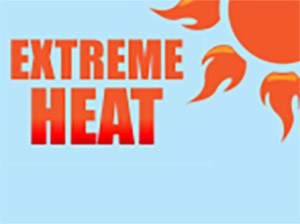Mon – Fri: 8:30 – 4:00
Closed from 12–1pm
Ewing, NJ 08628
It’s not the heat, it’s the humidity.
 Sweltering temperatures continue to plague areas across the U.S., Europe, and Asia with apparently no relief in sight. According to New York Times reporting, 74 major U.S. cities are forecast to have dangerous levels of heat on one or more days.[1] We’ve heard reports of extended temperatures over 100⁰ across the southern regions of the country and heat index values in the 100s in the Southeast.
Sweltering temperatures continue to plague areas across the U.S., Europe, and Asia with apparently no relief in sight. According to New York Times reporting, 74 major U.S. cities are forecast to have dangerous levels of heat on one or more days.[1] We’ve heard reports of extended temperatures over 100⁰ across the southern regions of the country and heat index values in the 100s in the Southeast.
Phoenix, AZ has had temperatures at or above 110⁰ for the past 20 days with temperatures above 90⁰ for the past 10 days running. Just today, it was reported that a 71-year-old man died after a Death Valley, CA trip on Tuesday when the temperatures hit as high as 121⁰.[2]
While we here in New Jersey have not seen temperatures at that level, we have seen some in the 90s and the 10-day forecast for our area predicts temperatures in the 80s and 90s. Humid conditions also plague that forecast raising the “heat index” to uncomfortable levels. Humid heat makes it harder for the body to release heat and cool off and thus is more dangerous at lower temperatures.
It is what the temperature feels like when you combine the air temperature with the relative humidity. According to the National Weather Service, “when the body gets too hot, it begins to perspire or sweat to cool itself off. If the perspiration is not able to evaporate, the body cannot regulate its temperature. Evaporation is a cooling process. When perspiration is evaporated off the body, it effectively reduces the body's temperature. When the atmospheric moisture content (i.e. relative humidity) is high, the rate of evaporation from the body decreases. In other words, the human body feels warmer in humid conditions. The opposite is true when the relative humidity decreases because the rate of perspiration increases. The body actually feels cooler in arid conditions. There is direct relationship between the air temperature and relative humidity and the heat index, meaning as the air temperature and relative humidity increase (decrease), the heat index increases (decreases).”[3]
 Extreme heat is defined as a period of high heat and humidity with temperatures above 90 degrees for at least two to three days. During a period of extreme heat your body has to work extra hard to maintain a normal temperature, which can lead to death. Extreme heat is responsible for the highest number of annual deaths among all weather-related hazards. We offer the following tips from Ready.gov, a government website promoting emergency preparedness, to help you stay safe during the hot and humid days ahead.
Extreme heat is defined as a period of high heat and humidity with temperatures above 90 degrees for at least two to three days. During a period of extreme heat your body has to work extra hard to maintain a normal temperature, which can lead to death. Extreme heat is responsible for the highest number of annual deaths among all weather-related hazards. We offer the following tips from Ready.gov, a government website promoting emergency preparedness, to help you stay safe during the hot and humid days ahead.
Older adults, children, sick or overweight individuals, pregnant women, and people with chronic medical conditions are at greater risk from extreme heat.

Know the signs of heat-related illnesses and ways to respond. If you are sick and need medical attention, contact your healthcare provider for advice and shelter in place if you can. If you are experiencing a medical emergency call 9-1-1.
If you suspect heat stroke, call 9-1-1 or get the person to a hospital immediately. Cool down with whatever methods are available until medical help arrives. Do not give the person anything to drink.
If you have signs of heat cramps or heat exhaustion, go to a cooler location, and cool down by removing excess clothing and taking sips of sports drinks or water. Call your healthcare provider if symptoms get worse or last more than an hour.
Heat is a leading weather-related killer generating hundreds of fatalities every year. Follow the recommendations above to be smart and safe during the summertime heat.
[1] https://www.nytimes.com/interactive/2022/us/heat-wave-map-tracker.html?
[2] https://www.washingtonpost.com/weather/2023/07/18/extreme-heat-record-limits-human-survival/